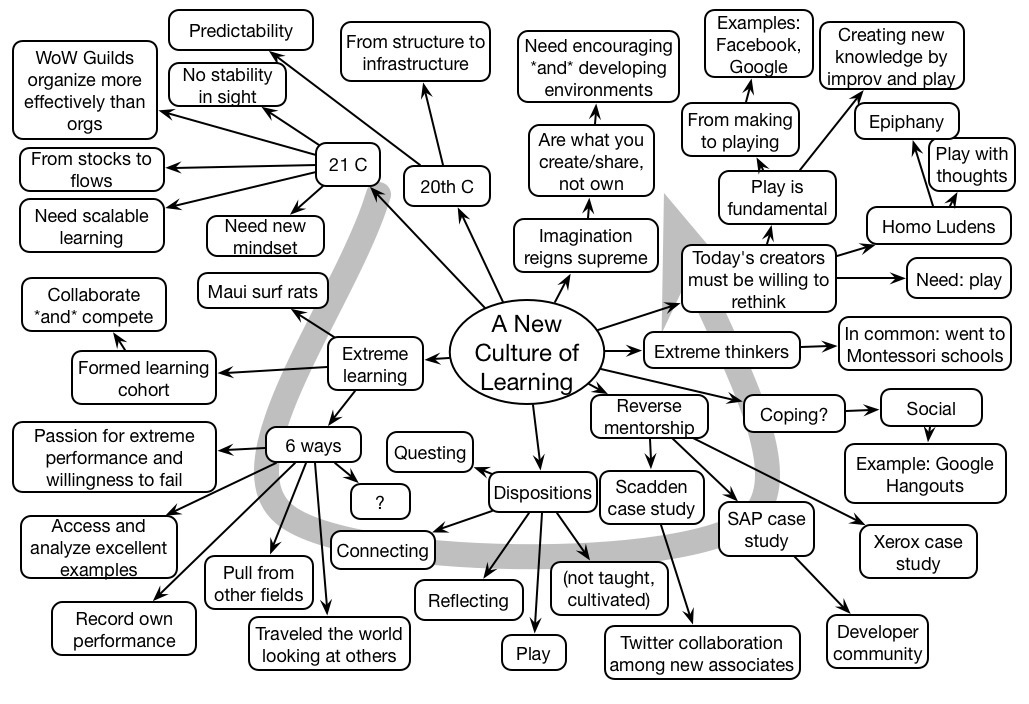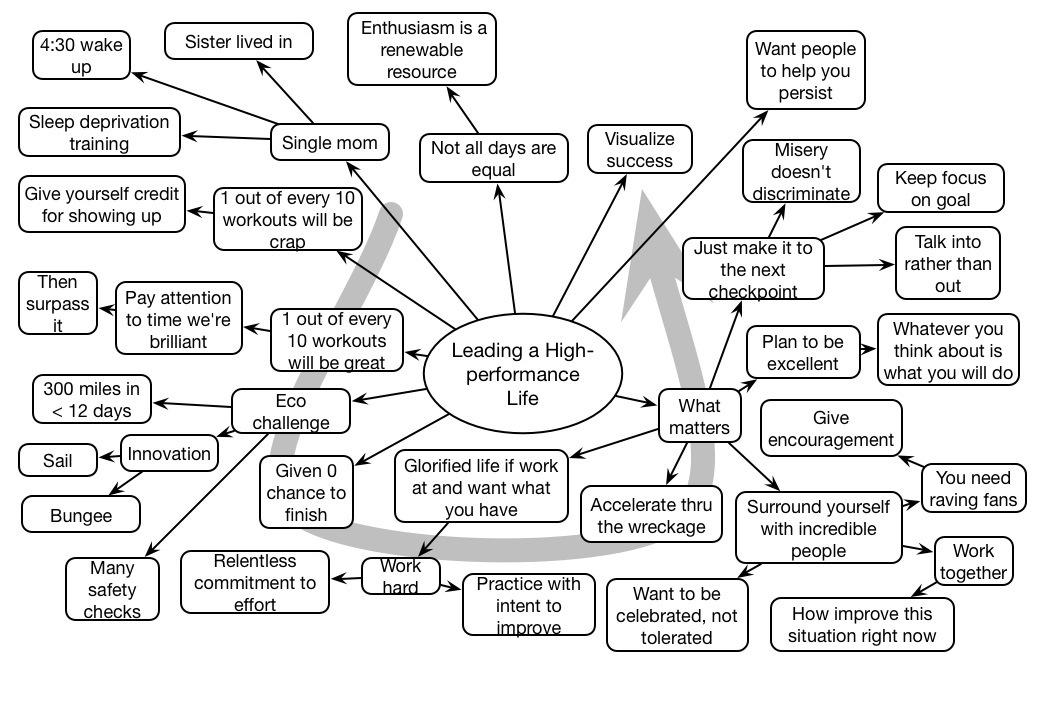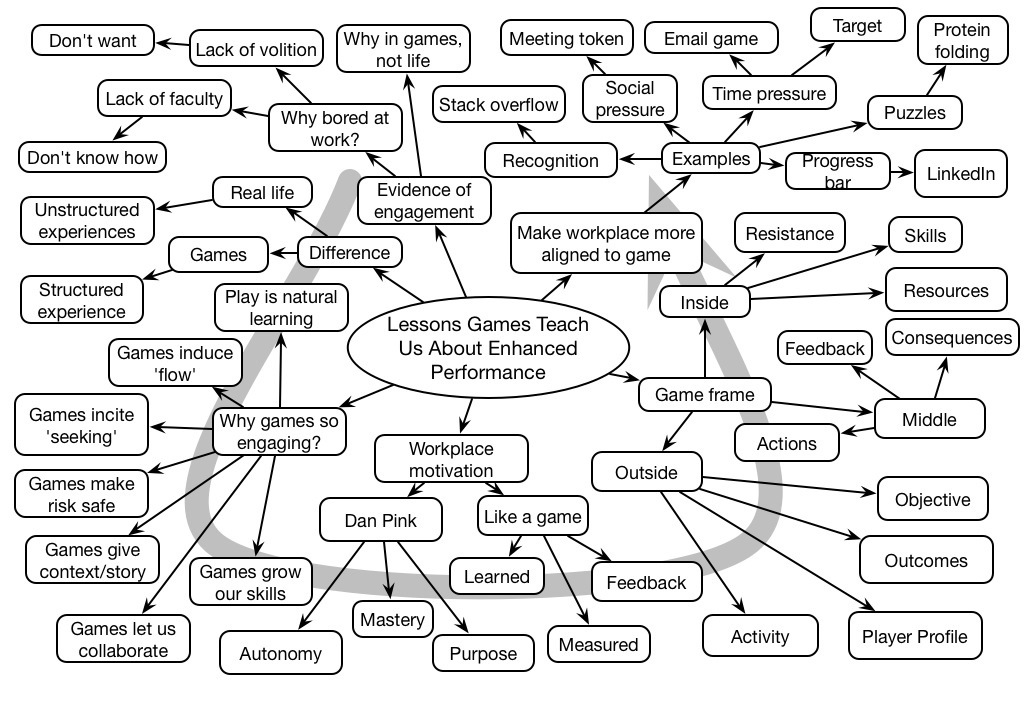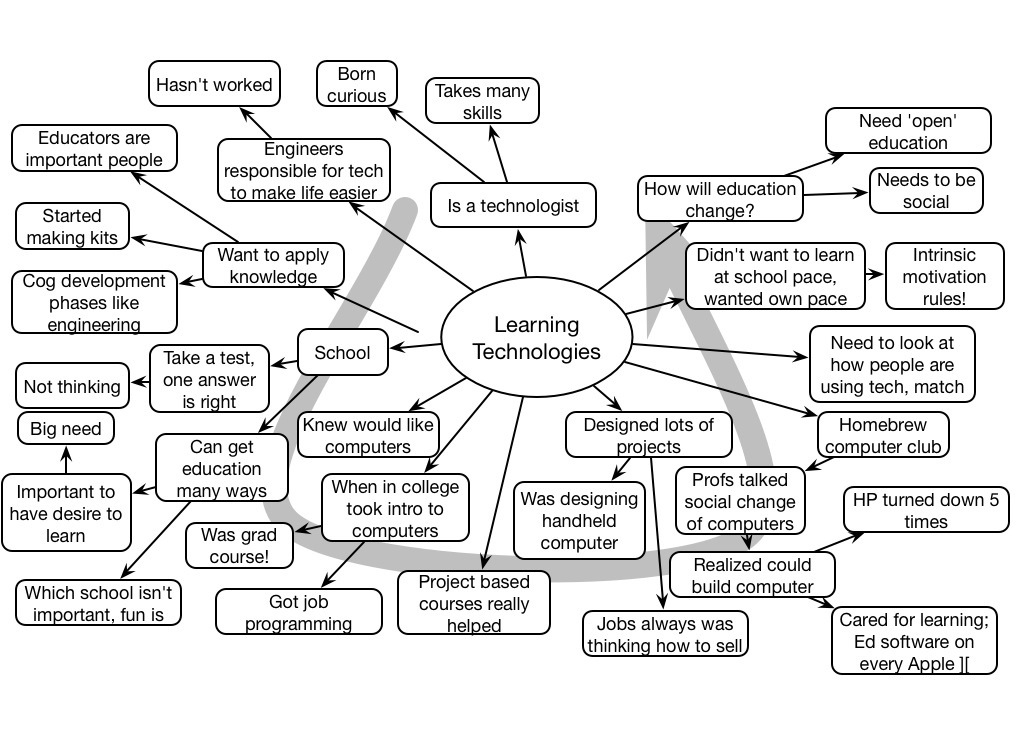John Seely Brown spoke eloquently on extreme learning for coping with extreme change, e.g. now. He talked about how extreme learning resembles play and challenged us to create environments where imagination could flourish.
Starting Strategy
If you’re going to move towards the performance ecosystem, a technology-enabled workplace, where do you start? Partly it depends on where you’re at, as well as where you’re going, but it also likely depends on what type of org you are. While the longer term customization is very unique, I wondered if there were some meaningful categorizations.
 What would characterize the reasons why you might start with formal learning, versus performance support, versus social? My initial reaction, after working with my ITA colleagues, would be that you should start with social. As things are moving faster, you just can’t keep ahead of the game while creating formal resources, and equipping folks to help each other is probably your best bet. A second step would then likely be performance support, helping people in the moment. Formal learning would then backstop for those things that are static and defined enough, or meta- enough (more generic approaches) that there’s a reason to consolidate it.
What would characterize the reasons why you might start with formal learning, versus performance support, versus social? My initial reaction, after working with my ITA colleagues, would be that you should start with social. As things are moving faster, you just can’t keep ahead of the game while creating formal resources, and equipping folks to help each other is probably your best bet. A second step would then likely be performance support, helping people in the moment. Formal learning would then backstop for those things that are static and defined enough, or meta- enough (more generic approaches) that there’s a reason to consolidate it.
However, it occurred to me that this might change depending on the nature of the organization. So, for example, if you are in an organization with lots of new members (e.g. the military, fast food franchises), formal learning might well be your best starting point. Formal learning really serves novices best.
So when might you want to start with performance support? Performance support largely serves practitioners trying to execute optimally. This might be something like manufacturing or something heavily regulated or evidence based, like medicine. The point here would be to helping folks who know why they’re doing what they’re doing, and have a good background, but need structure to not make human mistakes.
Social really comes to it’s fore for organizations depending on continual innovation: perhaps consumer products, or other organizations focused on customer experience, as well as in highly competitive areas. Here the creative friction between individuals is the highest value and consequently needs a supportive infrastructure.
Of course, your mileage may vary, and every organization will have places for all of the above, but this strikes me as a potential way to think about where you might want to place your emphasis. Other elements, like when to do better back end integration, and when to think about enabling via mobile, will have their own prioritization schemes, such as a highly mobile workforce for the latter.
So, what am I missing?
#itashare
Hire the ‘loud’?
In thinking about how organizations can ‘learn’, it strikes me that everyone needs to be simultaneously learning and teaching. How does that happen? I think it can be scaffolded, but it may also be an inherent trait.
A number of us are talking more about working out loud: Jane Bozarth and Harold Jarche talk about ‘narrating your work’, while I go on about ‘thinking out loud’ and ‘learning out loud’. The point is capitalizing on the benefits that come from putting your thoughts out: people can give you feedback, helping you learn; and folks can learn from you.
And, as I’ve said before, conversations are the engine of business. You need to be interacting to be advancing.
The recent story of Marissa Mayer, CEO of Yahoo, struck me as an interesting case. Here she’s bringing in folks who’ve been working remotely, or to put it another way she’s not allowing telecommuting any more. While there are obvious downsides, I can think of two justifications for that step:
- to get everyone back on the same page in regards to mission and vision
- to have folks sharing more
Both of these would be good outcomes for Yahoo. And I can see in both cases that it could be temporary: once you get the mission message shared, and have developed a culture of and infrastructure for sharing, folks could then again work from where they want. Of course, I have no idea whether that will actually happen.
The interesting thing for me was to contemplate those folks who don’t share. What to do? I know of folks who are happy to sit at home and do their job, and aren’t necessarily interested in the larger picture. What do you do? Sometimes these folks have useful skills. And they may have their own methods of keeping up to date. But if they’re not sharing, not contributing, what’s the overall picture?
And the thought occurred to me that those are folks that you bring in as contractors or consultants, but not as employees. Particularly in the case of a ‘no fire’ policy, who do you want on board? It seems to me that the employees you want are the ones who are continually learning and contributing to the organization’s overall knowledge.
Sure, there’s lots more you’d have to get right: safety to speak out loud, tolerating diversity, openness to new ideas, but having folks who are willing to learn together seems to me to be one criteria for an organization that will thrive.
So, is this a plausible component of a hiring policy? Those who demonstrably narrate their work are the ones to attract, develop, and reward?
#itashare
Aligning coherency
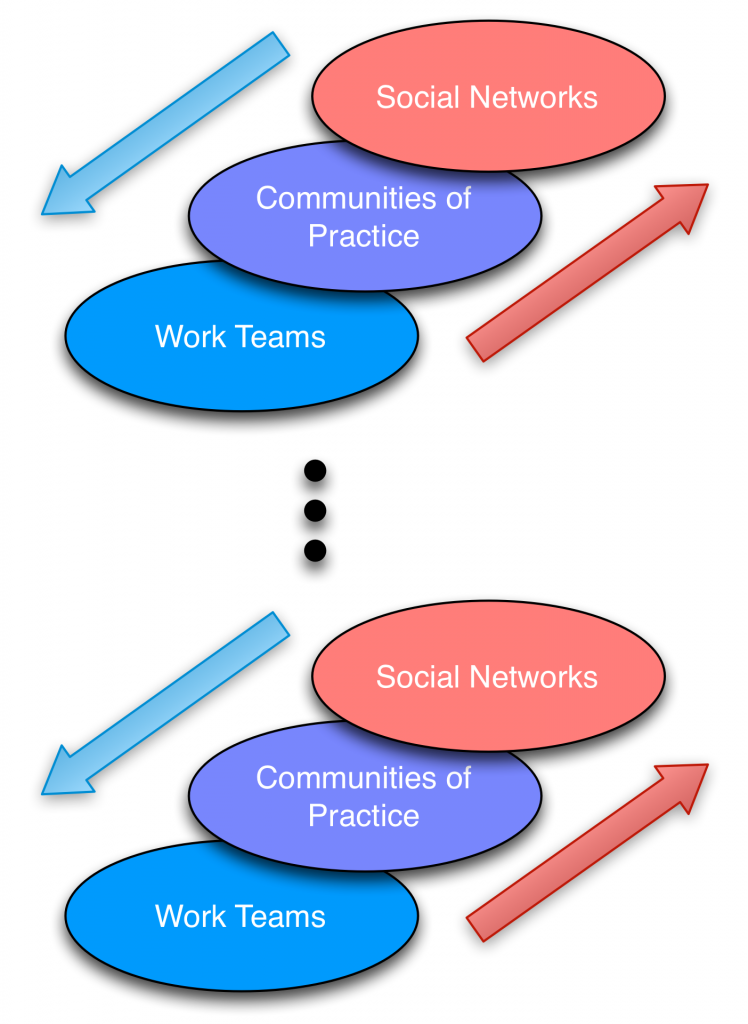
In thinking about the coherent organization, a couple of realizations occurred to me. One is about how those layers actually are replicated at different levels. The other is how those levels need to be aligned in the organization to the overall vision.
For one, those work teams can be at any level. There will be work teams at the level that the work gets done, but there’ll also be work teams at the management and even executive levels. Similarly, there are communities of practice at all these levels as well. Even the top level executives can be members of several communities, including as executives of their org, but also with their peers at other orgs.
Moreover, at each of these levels they need to be tapping into what’s happening outside the organization, and tracking the implications for what they do. They need to feed back out as well (of course, not their proprietary information).
The two way flow of information has to be in and out as well as up and down. Communication, for both collaboration and cooperation, is key.
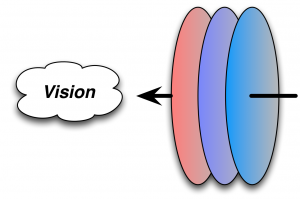 A second necessary component is alignment. Those groups, at every level, need to be working in alignment with the broader organization’s goals, and vision. When Dan Pink talks about the elements of motivation in Drive, the 3rd element, purpose, is about knowing what you’re doing and why it’s important. So organizations have to be clear about what they’re about, and make sure everyone knows how they fit. Then you can provide autonomy and the paths to mastery (the other two elements) and get people working from intrinsic motivation.
A second necessary component is alignment. Those groups, at every level, need to be working in alignment with the broader organization’s goals, and vision. When Dan Pink talks about the elements of motivation in Drive, the 3rd element, purpose, is about knowing what you’re doing and why it’s important. So organizations have to be clear about what they’re about, and make sure everyone knows how they fit. Then you can provide autonomy and the paths to mastery (the other two elements) and get people working from intrinsic motivation.
The integrated focus on communication and alignment are two keys to developing the ability to continually innovate, and cope in the increasing complexity which will make or break an organization. That’s how it seems to me.
#itashare
Yvonne Camus #LSCon Keynote Mindmap
Aaron Dignan #LSCon Keynote Mindmap
Leadership for Complexity
The other meme from the retreat event last weekend was the notion of leadership for complexity. A few of us decided to workshop a topic around performance, leadership, and technology. We realized technology was only a means to an end, and the real issue was how to move organizations to optimal performance (e.g. the Coherent Organization).
We talked through how things are moving from complicated to complex (and how important it is to recognize the difference), and that organizations need to receive the wake-up call and start moving forward. Using the Cynefin model, the value will not come from the simple (which should be automated) nor the complicated (which can be outsourced), but from dealing with the complex (and chaotic). This won’t come from training and top down management. As I’ve said before, optimal execution will only be the cost of entry, and the differentiator (and hence the value) will be continual evaluation. And that comes from a creative and collaborative workforce. The issue really is to recognize the need to seize new directions, and then execute the change.
One concern was whether we were talking evolution or revolution. Rather than taking an either or, I was inclined to think that you needed revolutionary thinking (I like Kathy Sierra’s take on this), but that you fundamentally can’t revolutionize an organization short of total replacement (“blood on the streets” as one colleague gleefully put it :). I reckoned a committed change initiative to the place the revolutionary thinking pointed was what was needed.
The issue, then, is the vision and guidance to get there. What’s needed is leadership that can lead the organization to be able to leverage complexity for success. This will be about equipping and empowering people to work together on shared goals: sharing, commenting, contributing, collaborating, and more. It will be inherently experimental in an ongoing way.
What that means practically is an exercise I (and we) are continually working on, but we’ve coalesced on the top-level frameworks to form the basis of tools, and what’s needed are some organizations to co-develop the solutions. Design-based research] if you will. So who’s up for working on the path to the future?
#itashare
Steve Wozniak #eli3 Keynote Mindmap
The legendary Steve “The Woz” Wozniak was the opening keynote at the 3rd International Conference of e-Learning and Distance Learning. In a wide-ranging, engaging, and personal speech, Steve made a powerful plea for the value of the thoughtful learner and intrinsic motivation, project-based learning, social, and self-paced learning.
Old -> New
My ITA Colleague Jay Cross had a hangout over the weekend and the conversation rolled around to the role of L&D in the new era (related to yesterday’s post). I’ve previously addressed how we can now be using tech for more of the full suite of performance, but it occurred to me that there are some ways we could and should be thinking differently about the ways in which performance can be supported. And while these old:new lists are fun and sometimes overdone, and these may have been covered elsewhere by others, it seemed reasonable to go through a few that occurred to me.
Courses -> Search
The first is that too often we think of courses, but what’s happening these days is that people are increasingly self-helping. Rather than take a course ‘just in case’, they’re getting the help they need ‘just in time’. It seems to me that we should be focusing on making sure that learners have good search skills, and searchable and well-organized portals, to ensure searching success. Whether you view it as performance support or a ‘teachable’ moment, the fact is that learners are self-serving, going for pull solutions more. The goal is to support performers how they want to, and are learning, rather than trying to force them into our models.
Instruction -> Coaching
As social media is more available, people are more available, and people are often reaching out to others for support rather than courses. Whether it’s a quick query through a microblog or a full blown video chat, people are increasingly reaching out to folks for help. This is similar to the courses/search above, but sometimes they go for content and sometimes for people. Are you making it easy to reach out to people?
Development -> Mentoring
Rather than developing people through programs, increasingly people are looking for mentoring. Programmed development is like taking the bus, when mentoring is like having a chauffeur. It may seem extravagant, but folks like to help, and increasingly having a program of ‘each one teach one’, where those who’ve benefitted from mentoring pass it on, is workable. With digital support, this becomes both a more momentary, and longer term activity. It’s increasingly viable, so it should be on your radar.
Read -> Watch
It used to be that to the only way to find things out was to read the manual, or a step-by-step job aid. That’s no longer true, and increasingly it’s easy to create videos that show how to do things. So, for example, it’s now easy to create software ‘walkthrus’, and it’s not just the L&D department that are creating them. Learners are getting them through services like Lynda.com, and creating their own with screen casting software. Not to say reading won’t continue to play a role for concepts, but for procedures, the context and dynamism makes videos powerful. Are you supporting video/screen cast creation, hosting, and searching?
Test -> Simulation
The pragmatic barriers to creating simulations are falling down, and we now know that knowledge test isn’t an adequate assessment of ability to apply. We no longer have to have separate summative assessments, as digital environments can store performance as part of a portfolio of ability. Most importantly, we can make the practice environment much closer to the performance environment. When we’ve determined a real skill needs to be developed, we can and should be looking at rich assessments of ability.
“’til they get it right” -> “’til they can’t get it wrong”
Coupled with the above is the notion that we can move from minimal practice that isn’t sufficient to develop capability and confidence, and start providing sufficient practice to ensure ability. We need to be spacing it out over time, and ensuring real competence, not just until folks have had a taste of it, but inadequate to develop real capability. If it matters, we need to match practice to task and learner, and we can.
Desktop -> Mobile
People are now going ‘mobile first’, as are companies like Google. The reality is that the mobile devices are more familiar, and more available. People are getting in the habit of getting their support through a mobile device. And enterprise platforms are increasingly making that solution available. Are you enabling your workers to meet their needs with mobile?
These are just a few ways we can, and should, be shifting our thinking. I’m sure you’ve got more, and I look forward to hearing them.
#itashare
Starting from scratch
From a conversation with my ITA colleagues, talking about the (self-imposed) death of L&D that Charles wrote about, Jane wondered what we might do if we were starting from scratch. I decided to take this on, thinking about an org that was already in operation, with it’s goals, processes, and practices, and what I might do if I were to come in and get it going (with the support of the executive team to do what I thought was right).
My initial step would be to establish a social media system, supporting conversations and collaboration on work teams and communities of practice. I’d make sure that folks could establish dialogs, work together on documents, and share files, quick pointers, and more fully developed thoughts. They’d also be able to both create and share media, video, audio, and screencasts. I’d want to have some folks supporting the development of the use of this capability, in a performance consulting or performance strategist role.
Associated with this would be a big emphasis on transparency in communication, with the overall mission of the org percolating all the way through, and emphasizing the part each role plays in the overall picture. Another emphasis would be on developing individual capability for self-learning.
My second step would be to set up a mechanism to support portals organized around work tasks (not by org silo), where media, files, and conversations around topics could happen. The goal is to have tools ‘to hand’ as well as people. Thus, any created job aids would be appropriately located. Again, with a performance strategy focus. This is related to the first point.
Finally, I’d consider formal learning to supplement the informal learning, in places where it demonstrably would add value, with a view to minimizing the use of this except where a sound business case could be made that the time spent was aligned to key business indicator, and that developing this skill was the necessary approach. And, perhaps, on ways to effectively take advantage of the systems indicated above. However, a longer term approach than the ‘event’ model would be used. I’d want to track activity, not just content and assessment. Compliance and onboarding, typically roles for formal learning, would have a different look than currently.
I’d supplement this with mobile access, and ultimately start looking for ways to add contextual support. I’d be looking for business impact across the board. I’d probably structure this as a performance unit, and ensure that the staff are trained to look at the full suite of opportunities to improve performance including social, and consider the emotional side – motivation, anxiety, and confidence – as well as the cognitive.
This is all hypothetical, of course, but I think it’s illustrative of a different way of approaching this. I think that the way things are going: changing faster, dealing with more ambiguity ,and requiring more ingenuity and innovation, require a different approach than the assess, prepare, rollout model. The focus increasingly is on supporting people meeting their needs, instead of attempting to meet their needs. Organizations have to be more nimble, and this approach starts there and works back, instead of the other way around.
#itashare
